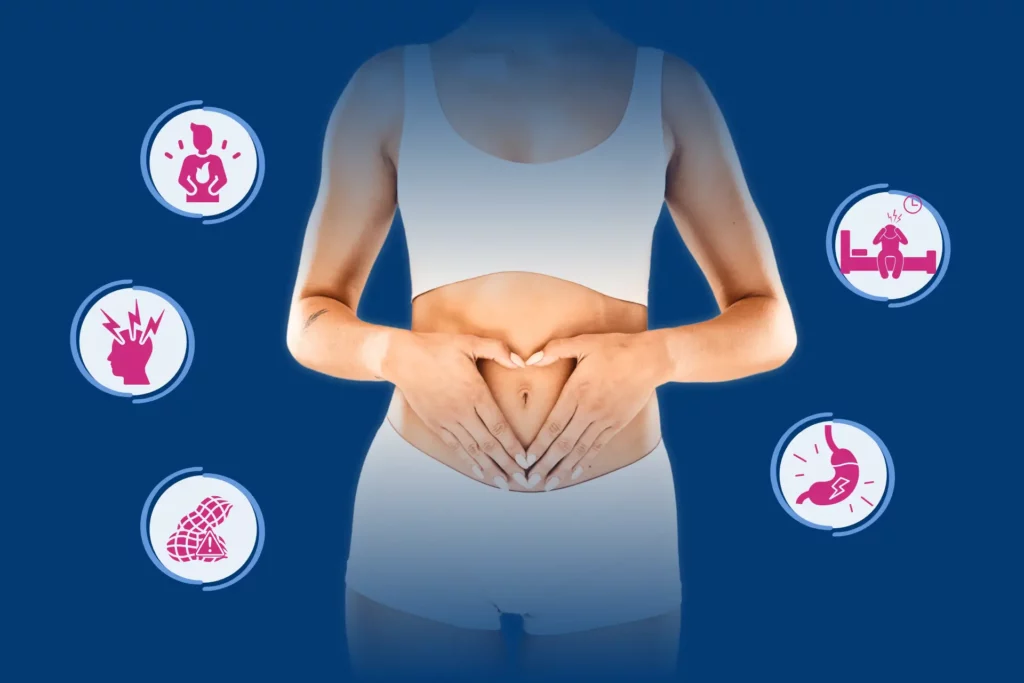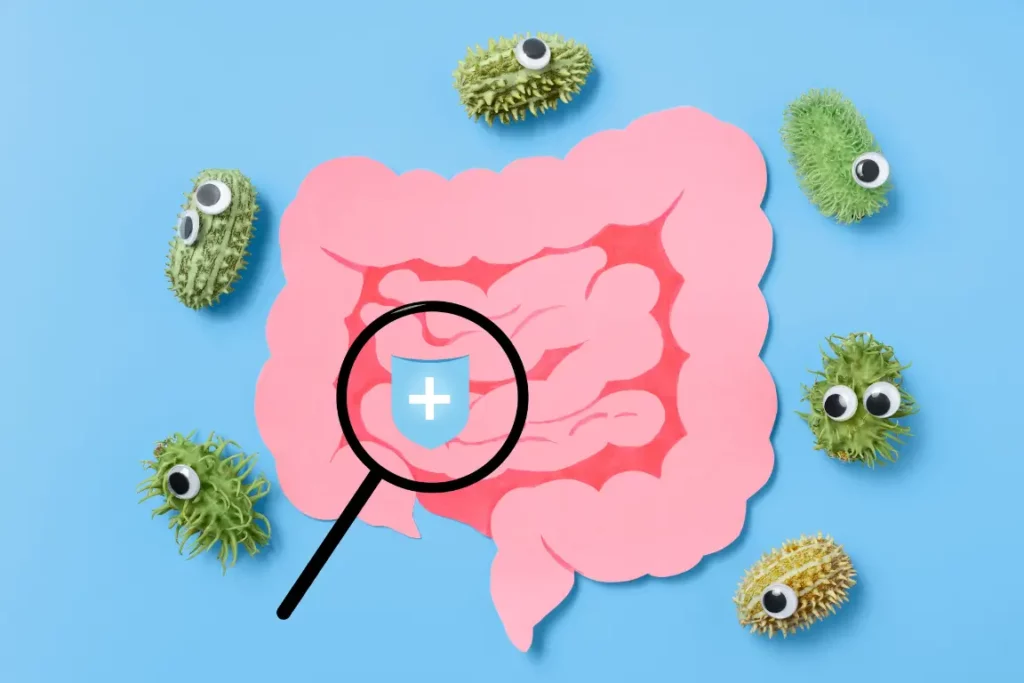Diagnosis of colorectal cancer (CRC) is common among the seniors, right? Think again! Surgeons at Yale warn people as young as 20 to be aware of the warning signs of colorectal cancer. With a growing number of people in the younger generations being diagnosed with colorectal cancer, the number of incidences in the older generations is declining. So, why is colorectal cancer rising in young people? Let’s explore several factors, what experts need to say, and the best way for youngsters to lower their risk of this cancer.
The Rising Tide: Early-onset Colorectal Cancer Trends
A 2023 report by the American Cancer Society gave us some striking facts regarding the trend of early-onset colorectal cancer (EOCRC):
Incidence Rates Over Time (<50 vs. ≥50)
- 20% of colorectal cancer diagnoses in 2019 were in people under 54.
This figure was double that of the incidence in 1995.
- The rates of advanced disease increased about 3% annually in people younger than 50.
Demographic Patterns: Age, Sex & Geography
A 2025 Lancet study reported that in recent years (2013-2017), the incidence rate of early-onset colorectal cancer was the highest in Australia, followed by the USA, New Zealand, and South Korea.
The lowest incidences were reported in Uganda and India.
The Key Drivers Of The Increase In Early-onset Colorectal Cancer
The rate of rising cases of colorectal cancer in young people is alarming, prompting researchers to determine the key drivers of this trend.
Lifestyle Shifts Since The 1980s
Whether we accept it or not, there has been a significant shift in the way we live today—from our diet to our working schedules, routines, stress levels, and sleep quality.
Here are a few lifestyle factors that may be contributing to the uptick in colorectal cancer cases among the younger generation.
- Western Diet & Ultra-processed Foods
There is substantial evidence that eating an unhealthy diet, that is high in processed meat, fat, and low in fibre-rich fruits and vegetables, may contribute to an early onset of colorectal cancer.
- Sedentary Behavior and the Obesity Epidemic
Studies have shown that obesity and being overweight may increase an individual’s risk of getting early-onset colorectal cancer.
According to Case Comprehensive Cancer Centre’s electronic health records, more than 50% of younger adults with colorectal cancer were overweight, and 17% were obese.
Studies have shown that an increase in TV time (which indicates a more sedentary or inactive behavior) was also linked to a higher risk of early-onset colorectal cancer.
Microbiome Alterations Across Generations
Another important factor contributing to early-onset colorectal cancer in young people is the gut microbiome (bacteria in the gut).
There is some evidence to suggest that generational-level shifts in the composition of the human gut microbiome may be associated with cancer of the gastrointestinal system, including colorectal cancer.
This means that the younger generations have been exposed to different factors by a certain age than the generations before at the same age.
These factors contribute to a greater risk profile for diseases, including colorectal cancer, in the younger population than in the generations before.
- Early-life Exposures and Antibiotic Use
Did you know early-life exposure and antibiotic use in younger generations may have altered their gut microbiome?
This may have led to inflammation of the gut, immune dysfunction, and an increased susceptibility to colorectal cancer.
In a 2023 study, researchers found that long-term or recurrent antibiotic use increased the risk of early-onset colorectal carcinoma.
This effect was found to be stronger in people with a specific variant of the fucosyltransferase 2 (FUT2) gene.
A recent study highlighted that early life exposure to colibactin, a bacterial toxin, may be causing an alarming rise in early-onset colorectal cancer.
Colibactin exposure in early childhood causes a distinct change in the genetic makeup of the DNA of colon cells.
This may be a contributing factor.
- Environmental & Chemical Pollutants
Exposure to hazardous chemicals like asbestos, industrial pollutants, and particulate air pollutants may also increase the risk of early-onset colorectal cancer.
A 2022 study found that outdoor particulate matter resulted in a 25% increased risk of colorectal cancer.
Non-Modifiable Risk Factors
So far, we have examined the modifiable risk factors of colorectal cancer.
However, factors like genes and heredity are non-modifiable risk factors for the condition.
Genetic Predispositions (Lynch, FAP)
Two hereditary syndromes that have a strong link to an increased risk of colorectal cancer are Lynch syndrome (HNPCC) and Familial Adenomatous Polyposis (FAP).
Lynch Syndrome
This condition is thanks to inherited mutations (abnormal changes) in the MMR (mismatch repair) genes like MLH1, MSH2, MSH6, PMS2, and EPCAM.
These genes disrupt the body’s ability to repair DNA errors, resulting in an increased risk for various cancers, like colorectal cancer, at a young age.
According to the American Cancer Society, the lifetime risk of colorectal cancer in people with Lynch syndrome can be as high as 50%.
Familial Adenomatous Polyposis (FAP)
FAP is a genetic condition that causes growth of numerous adenomatous polyps in the colon and rectum, which significantly increase the risk of CRC.
People with FAP have a near 100% lifetime risk of developing CRC, if left untreated.
Mutations in the APC gene may cause FAP.
Family History And Heritable Syndromes
A family history of colorectal cancer in first-degree relatives also elevates the risk of developing the condition.
Early-onset colorectal cancer is a strong indicator of a possible genetic component.
Biological Mechanisms Behind Early-Onset
Few biological mechanisms are at play when it comes to early-onset colorectal cancer.
However, these are still under study.
Epigenetic Aging of Colonic Cells
A study was conducted among 2500 middle-aged South Koreans to determine their biological age.
The study included a combination of physical, biochemical, and hormonal markers.
622 of the participants showed an increased risk of CRC.
This shows that people with an increased biological age were more likely to develop distal CRC.
There is a growing body of research that suggests biological or epigenetic aging plays a vital role in the early detection of cancer in adults younger than 55.
Chronic Inflammation and Immune Dysregulation
Chronic inflammation may drive the growth and development of colorectal cancer by dysregulating molecular pathways within the immune system.
When there is chronic inflammation in the body, there is an increased production of inflammatory mediators and DNA damage.
Chronic inflammation also predisposes individuals to cancer by promoting the accumulation of genetic mutations (abnormal changes in the genes).
These processes disrupt the normal cellular function and promote the development and progression of cancers, including colorectal cancer.
Screening Gaps Fueling Delays
While an increasing number of youth and people younger than 50 are being diagnosed with colorectal cancer, it is important to note that the diagnosis is being made at advanced stages of the disease.
This shows a glaring gap in screening.
Current Guidelines vs. Rising Under-45 Incidence
Unfortunately, current guidelines have not fully addressed this shift.
Many younger adults, therefore, fall outside the eligibility window for routine screenings, leaving a critical gap where early disease often goes undetected.
This misalignment delays timely diagnosis and treatment, allowing colorectal cancer to progress to more advanced stages before it is diagnosed.
Symptom Misattribution and Diagnostic Lag
In addition to screening challenges, initial and early symptoms of CRC in younger individuals, like rectal bleeding, abdominal pain, or changes in bowel movement, are often misattributed to benign conditions like irritable bowel syndrome (IBS) or haemorrhoids.
As a result, diagnostic lag becomes a significant barrier, often stretching months or even years, and contributing to poorer outcomes and higher mortality in early-onset CRC cases.
Call for Risk-based, Lower-Age Screening Trials
For the reasons mentioned above, there is a dire need to shift from age-based to risk-based screening for colorectal cancer.
Trials are being conducted worldwide to identify high-risk individuals based on:
- Genetic factors
- Family history
- Lifestyle
- Early symptoms
Prevention Strategies for At-Risk Youth
Preventing early onset colorectal cancer in at-risk individuals is twofold: Regular screening and management of lifestyle factors. These include:
Dietary Interventions: Fiber & Plant-Based Foods
Increasing dietary fiber intake is known to reduce the risk of colorectal cancer.
Here’s what fibre does in the gut:
- It increases stool bulk
- Dilutes carcinogens
- Shortens transit time through the colon
This reduces the contact between harmful substances and the colon lining.
Fiber fermentation in the gut is known to produce short-chain fatty acids, some of which may have tumor-suppressive effects.
Some dietary interventions to follow include:
- Increase intake of vegetables, fruits, and whole grains
- Limit intake of processed foods, red meat, and animal fat
The dietitian-nutritionist team at Memorial Sloan Kettering Cancer Center recommends people to consume at least 25 g of fiber per day.
“Consume the bulk of your fiber from whole foods like whole grains, vegetables, and fruit,” advises Clinical dietitian-nutritionist Cara Anselmo, MS, RDN.
Physical Activity Guidelines for Colon Health
Studies show that higher levels of physical activity reduce the relative risk of colon cancer by up to 20%.
Some studies have shown that weight training exercises may reduce the risk of colorectal cancer. However, this area requires more research.
Engaging in moderate-intensity physical activity for 150 minutes during the week could reduce colon cancer risk by 8%.
In fact, scientists found that any kind of physical activity (light, moderate or intense) contributed to decreasing colorectal cancer risk.
Physical activity contributes to weight loss, which in turn reduces insulin resistance and, subsequently, the risk for colorectal cancer.
Microbiome-Friendly Practices (Probiotics, Reduced Antibiotics)
Research suggests that microbiome-friendly practices like probiotic consumption and reduced antibiotic usage may help prevent colon cancer.
Frequent and inadvertent use of antibiotics can cause dysbiosis (an imbalance of bacteria in the gut).
Dysbiosis has links to the development of a variety of diseases, including colorectal cancer.
So, reduced antibiotic use and therapeutics like probiotics can improve the gut microbiome and may help fight early-onset colorectal cancer in youth.
Frequently Asked Questions
What Is The New Cause Of Colon Cancer?
Scientists have identified a toxin called colibactin that could be a new cause for colon cancer.
Escherichia coli bacteria that live in your colon and rectum produce colibactin, which can alter your DNA.
Early childhood exposure to this toxin may increase the individual’s risk for early-onset colorectal cancer.
Do Certain Foods Cause Colon Cancer?
Some foods that lead to inflammation in the body could cause colorectal cancer. Some of these include:
- Red meat
- Processed foods, including meat
- Sugary foods
- Alcohol
In addition to these foods, a lack of fibre-rich and nutritious foods also contributes to the increased risk of colorectal cancer.
What Virus Causes Colon Cancer?
Three viruses– Epstein-Barr virus (EBV), Human Papillomavirus (HPV), and John Cunningham virus (JCV) are known to cause colorectal cancer.
How To Avoid Colon Cancer?
Some ways to reduce the risk of colon cancer include:
- Eat a healthy diet loaded with fibre
- Choose healthy fats
- Aim for a minimum of 150-180 minutes of moderate intensity activity every week.
- Maintain a healthy weight
- Avoid smoking alcohol
- Manage other risk factors like insulin resistance and diabetes
It is also important for people at risk to undergo regular screenings to identify the earliest signs of colorectal cancer and improve treatment outcomes.
Summary: Why Is Colorectal Cancer Rising In Young People?
- There has been an alarming rise in the number of young people diagnosed with colorectal cancer.
- Factors like processed foods, sedentary and inactive lifestyles, obesity, inadvertent use of antibiotics, and exposure to pollutants may be increasing the risk of colorectal cancer.
- Biological mechanisms like epigenetic aging of colon cells and chronic inflammation may be contributing to the early onset of colorectal cancer.
- Screening gaps, misattribution, and diagnostic labs may be the reason why early-onset colorectal cancer in the younger generation is being diagnosed at an advanced stage.
- Dietary interventions, regular exercise, and microbiome-friendly practices may improve gut health and reduce the risk of colorectal cancer among the youth.
Others Are Also Reading

10 Signs Of An Unhealthy Gut You Should Watch Out For In 2025

Are Postbiotics Better Than Probiotics For Gut Health?

Top 5 Teas For Better Gut Health
References
- https://www.youtube.com/watch?v=p-leoS9AZz4
- https://www.yalemedicine.org/news/colorectal-cancer-in-young-people
- https://www.cancer.gov/news-events/cancer-currents-blog/2020/colorectal-cancer-rising-younger-adults/
- https://www.mdanderson.org/cancerwise/why-are-more-young-adults-getting-colorectal-cancer-what-to-know.h00-159385890.html/
- https://www.facs.org/for-medical-professionals/news-publications/news-and-articles/bulletin/2024/november-december-2024-volume-109-issue-10/clinicians-struggle-to-understand-dramatic-rise-in-early-onset-colorectal-cancer/
- https://www.fredhutch.org/en/news/center-news/2024/03/study-digs-into-whats-driving-early-onset-colon-cancer.html





